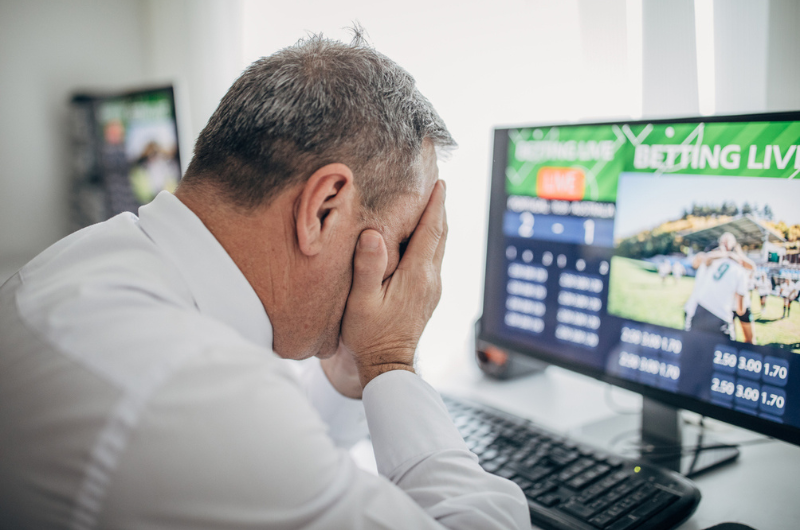Should I Stop Gambling?

May 29, 2025
You tell yourself it’s just for fun. You’re only spending what you can afford. But lately, it’s hard to ignore that little voice in your head asking, is this becoming a problem?
If this sounds like you, you’re not alone. Gambling has become easier and more accessible than ever – from casinos and sports betting apps to online poker and slot machines. According to the National Council on Problem Gambling, about 2.5 million adults in the U.S. meet the criteria for a gambling disorder, and another 5 to 8 million have mild to moderate gambling problems.
But how do you know when it’s time to stop? To learn the answer, we spoke with James Sherer, M.D., deputy chief medical officer of Hackensack Meridian Health Carrier Clinic, who specializes in mental health and addiction care.
What is Problem Gambling?
Not everyone who gambles has a problem. But for some, it becomes more than just a game – it becomes a way to escape stress, numb emotions or chase the next big win.
“One of the first red flags I look for is whether someone lies about how much they’re gambling,” says Dr. Sherer. “Another major warning sign of a gambling addiction, which is also called problem gambling, is needing to gamble more and more to get the same level of excitement, or to make up for past losses.”
Two questions that come from a tool called the Lie/Bet Questionnaire can help you decide if your gambling is getting out of hand. If you answer “yes” to either one, it may be time to take a closer look at your gambling activities:
- Do you lie about your gambling? If you’re hiding how often you gamble or how much money you’ve lost, it might be a sign you’re not fully in control.
- Are you chasing your losses? If you keep gambling in hopes of winning back what you’ve already lost, that pattern can quickly spiral into bigger financial trouble.
Why Gambling Addiction is More Than a Money Problem
Most people think of gambling as a financial issue. And yes, it can lead to serious money troubles. But that’s not the full picture.
“Gambling often becomes a form of self-medication,” explains Dr. Sherer. “People use it to distract themselves from depression, anxiety or past trauma. But the real issues don’t go away, they just get worse.”
Gambling can also affect your:
- Mental health: Feelings of guilt, anxiety or depression often increase as gambling spirals out of control.
- Relationships: Lying, secrecy and time away from loved ones can damage trust and connection.
- Job performance: Preoccupation with betting can affect your focus and reliability at work.
- Other addictions: Gambling often goes hand-in-hand with alcohol or drug misuse, making everything more complicated.
Dr. Sherer has seen firsthand how quickly things can fall apart. “People can go from having a stable life to losing their home, job and support system,” he says. “It can happen fast.”
“I’m Good at This” And Other Dangerous Thoughts
One of the reasons people keep gambling, even when it’s causing problems, is the belief that they’re better at it than most.
“There’s this idea that ‘I’m really good at this, or I can beat the system,’” says Dr. Sherer. “But the truth is, the house always wins. These games are designed that way.”
It doesn’t help that gambling is glamorized in pop culture – with stories of big wins, professional poker players and flashy Vegas lifestyles. But for the majority of people, gambling is not a winning strategy. And the brain doesn’t always realize that.
“Gambling hijacks the same reward system in the brain as drugs and alcohol,” Dr. Sherer says. “It creates an illusion of control, even when someone is deep in debt or emotionally spiraling.”
Is It Time to Stop Gambling?
Still unsure if it’s time to cash out on your gambling habits? Dr. Sherer suggests asking yourself one final question that might help:
“If you met someone five years ago who gambled the way you do now, would you have thought they had a problem?”
If the answer is yes, it might be time to reevaluate.
Other signs that gambling is no longer just a hobby include:
- You think about gambling constantly, even during work or family events
- You feel irritable, anxious or depressed when you’re not gambling
- You gamble more often than you used to, or spend more money than you meant to
- You’ve tried to stop, but can’t
- You’re hiding your gambling from loved ones
- You’ve experienced serious consequences, such as losing money, relationships or work opportunities
What Should I Do Next?
You don’t have to have all the answers right now, but you don’t have to stay stuck either.
“One easy, no-pressure first step is attending a Gamblers Anonymous meeting,” says Dr. Sherer. “You don’t even have to speak. Just listening to others can be eye-opening.”
Hearing stories from people who’ve been in your shoes can help you decide if you’re ready to make a change. If you find yourself relating to what you hear, that’s a sign to take things seriously. And if you do need more support, there are treatment options that work. Therapy, support groups and even certain medications can help reduce compulsive urges and address the root causes of addiction.
“Unlike some other behavioral addictions, we have a stronger body of research when it comes to medications for gambling,” says Dr. Sherer. “In severe cases, they can make a big difference.”
Final Takeaways on Problem Gambling
Remember: This isn’t about luck. It’s about taking back control. If gambling is getting in the way of the life you want to live, there is hope.
Here’s a quick recap of what to keep in mind:
- Gambling can start out as fun but easily become harmful. If you're hiding how much you spend, chasing losses or thinking about gambling constantly, those are red flags.
- It’s not just about money. Problem gambling can affect your mood, relationships and even your physical health. It’s often tied to anxiety, depression or trauma – and ignoring those issues can make them worse.
- There is help. Groups like Gamblers Anonymous are a great first step. And if you need more support, mental health professionals can offer treatment, including medication that may help reduce the desire to gamble.
Recognizing a gambling problem takes courage. But it’s also the first step toward a better future – one with less stress, more connection and real peace of mind.
If you’re wondering whether it’s time to stop gambling, trust that small voice inside of you. Help is here, and healing is possible.
Next Steps & Resources
- To make an appointment with a doctor near you, call 800-822-8905 or visit our website.
- Learn more about our behavioral health services.
The material provided through HealthU is intended to be used as general information only and should not replace the advice of your physician. Always consult your physician for individual care.






